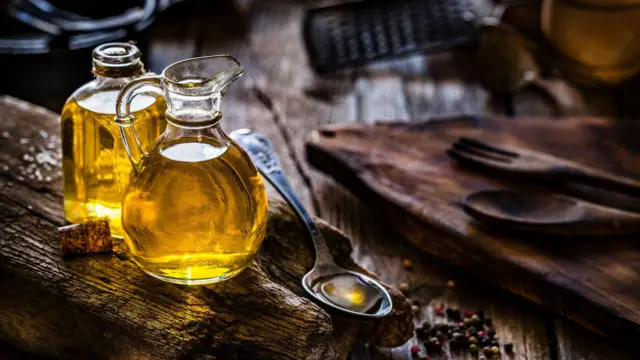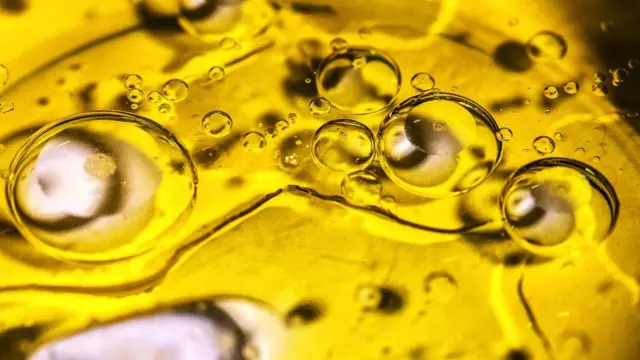
Wia dis foto come from, Getty Images
43 minutes wey don pass
E don dey fly upandan recently say seed oils like canola and sunflower oil get harmful effects. Dis na true?
You fit get bottle of sunflower oil or canola (rapeseed) oil inside your kitchen cupboard. You fit use am cook, spray ontop salad, seed oils dey popular across di world.
But dis seed oils don become centre of debate online.
For recent years, seed oils don dey collect plenty attack from social media wia some pipo dey claim say e dey "toxic", "poisonous" and dey damage pipo health.
Some critics don give some seed oils nickname as 'di hateful eight' - dis dey refer to di eight popular seed oils canola, corn, cottonseed, grapeseed, soy, rice bran, sunflower and safflower - and dey blame dem say na dem dey cause heart diseases and type 2 diabetes.
Question be weda na true true say seed oils be di enemy, abi pipo just dey fight dem for no reason?
Seed oils dey connected to heart issue?
Some pipo wey dey tok against seed oil dey focus on di high omega 6 fatty acid wey dey inside am. Omega 6 fatty acid na essential fatty acid, wey mean say we need dem, but we no fit produce dem oursefs.
For recent years, some scientists don argue say omega 6 fit cause chronic inflammation (e fit increase risk of developing diseases wey include heart disease and cancer).
But trials wey dem do show say omega 6 fatty acid no dey increase inflammation, na so Dariush Mozaffarian tok. Im be professor and doctor for di Food is Medicine Institute for Tufts University for Massachusetts, US.
"New research show say omega 6 fatty acids dey give rise to unique natural molecules like lipoxins, wey get powerful anti-inflammatory effects for body, na so Mozaffarian tok.
For recent research wey cover over 200,000 pipo for US wey dey around age 30, di researchers find out say pipo wey dey chop more of plant oil (including seed oils) dey less likely to die from cardiovascular diseases or cancer. On di oda hand, pipo wey dey take in more of butter dey likely to die during di same period.

Wia dis foto come from, Getty Images
Plenti observational studies about how omega 6 dey affect our hearts dey. Dem dey look into data of diet and health and find out say di two get relationship.
But some observational studies dey rely on account of wetin di pipo tok say dem eat, na so Matti Marklund tok. Im be professor of human nutrition for Johns Hopkins Bloomberg School of Public Health for US. E add say dis fit be problem as pipo fit no remember wetin dem eat or dem fit no dey honest about dia diet.
Anoda way to measure omega 6 intake na to measure how much di amount of omega 6 individual components and ingredients dey inside pesin diet. However Marklund add say e dey difficult to translate how much of food pesin chop into quantities.
Plenty studies wey dey investigate di effects of omega 6 fatty acids on our health dey focus on linoleic acid. Dis na omega 6 fatty acid wey dey in high amounts inside seed oil. Dem don find out say e dey lower bad LDL cholesterol inside blood.
For study wey dem do for 2019, Marklund focus on levels of fatty acid for blood of participants from 30 observational studies - wey some role for upto 30 years. E look at how many of dem develop cardiovascular disease and die from am. E find out say di ones wey get di highest levels of linoleic acid for blood, na dem get di lowest risk of developing cardiovascular disease.
Anoda allegation dem sama seed oils be say e dey harmful to pipo wey dey eat plenty of omega 6 if you compare am wit pipo wey dey take plenti omega 3.
Some confusion dey between omega 6 and health of di heart, na wetin Christopher Gardener tok, I'm be Director of nutrition studies for Stamford Prevention Research Centre for US.
Dis na sake of role wey omega 6 dey play wen blood clots happun, Gradner say pipo dey relate am only to stroke and heart attack.
E say Omega 3 dey do more of blood thinning. "If you get wound for your hand and you want make e clot, you gas need balance."
Meanwhile, scientists conclude for analysis of 30 studies wey dem conduct for 2019 say pipo wey get higher amounts of linoleic acid for dia blood dey 7% less likely to develop heart disease.
Linoleic (acid) fit improve cholesterol to reduce di risk of cardiovascular disease, and improve glucose metabolism wey dey reduces di risk of type 2 diabetes, na so Marklund tok.
Seed oils and 3.6 ratio
Anoda common accuse wey dem sama on seed oils be say to eat plenty omega 6 compared to eating omega 3 dey harmful.
For western world, omega 6 fatty acid dey account for around 15% of our total energy intake. Average person ratio of omega 3 to omega 6 fit be upto 50:1. However e suppose be like 4:1 to reduce our risk of cardiovascular disease, according to one study like dat.

Wia dis foto come from, Getty Images
Review and meta analysis wey World Health Organization do for 2022 report say higher omega 6:3 ratio dey associated wit greater risk of cognitive decline and ulcerative colitis, wey be chronic inflammatory bowel disease.
For di oda side, dem link higher omega 3:6 ratio to reduced risk of depression.
Di scientists wey conduct di WHO study conclude say higher omega intake of omega 6 fatty acid from sees oils dey unlikely to increase your risk of death and disease - but add say dem need more quality research.
But while some scientists dey argue say you no suppose get too much omega 6 for your system pass omega 3, Marklund say e better to take more omega 3, dan to reduce your omega 6, as both get health benefits.
How dem dey process seed oils
Unlike oda oils, na from plant dem dey from extract seed oils. Some dey concerned say dem dey extract seed oils wit hexane - wey be chemical wey dem make from crude oil - but little evidence dey wey suggest say di process fit cause issue.
Researchers don recently find out say omega 6 fit cause growth of one specific type of breast cancer. While some evidence suggest say hexane fit dey linked to plenty health conditions, after dem extract am, dem dey deodorise and bleach am to remove and additives.
Scientists fit tok say hexane extract dey normal for food processing, and say di process of deodorizing and bleaching it Dey help remove potential harmful compounds," na so Gardener tok.
Seed oils wey dem use cold-press method dey avoid di process completely, as di process involve to squeeze di seeds to extract di oil - but dis result dey more expensive.
Seed oils for cause growth of tumours?
Upon say plenty research dey wey show di potential benefits of omega 6 on our health, Researcher don recently find out say dis fatty acid fit fuel di growth of specific type of breast cancer. Di findings fit also get implications say di impact of omega 6 consumption on oda diseases.
Cancer cells dey use nutrients as fuel to grow and multiply but till now, dem bin get limited research wey dey look at di role wey omega 6 fatty acid dey play.

Wia dis foto come from, Alamy
But study wey dem publish for March dis year find mechanism wey linoleic acid, wey be omega 6 fatty acid dey use grow and multiply inside patients wey get triple negative breast cancer (TNBC).
Dis na di most aggressive sub-type of di disease and na one wey no dey respond to therapies.
Studies wey dem carry out before suggest say nothing dey link omega 6 fatty acid or any small increase in risk, na so Nikolaos Koundouros tok, im be postdoctoral associate for Weill Cornell Medicine Research Centre for New York. But e add say di studies no take into account say multiple sub-types of breast cancer dey, and e dey different from patient to patient unto how dem dey survive or ontop wetin dey cause dem, plus how dem dey respond to therapy.
TNBC be like e dey respond pass for linoleic acid, na so Koundouros tok.
Koundouros and oda team of researchers discover for lab say wen pesin take omega 6, TNBC cells go activate protein complex wey dey linked to tumor growth and progression. E get anoda protein wey dey in large amount for TNBC tumours, e dey take fatty acids and lipids throughout di body and inside cells to wia dem suppose be.
Koundouros explain say dese proteins, along wit omega 6 fit dey responsible for oda chronic diseases like obesity and diabetes.
Dis research fit bring new info about how to treat TNBC patients, but e no get wider implications for everyone, na so Koundouros tok.
E say "e dey important to remember say omega 6 fats dey essential for some reasons , if you cut dem off, you fit get bad side effects".
Which seed oil?
Some seed oils like canola and soya bin oil don get more studies pass odas and e get more balanced evidence base.
"All dese dey provide balanced combination of healthy fats, including monounsaturated fats, omega 6 polyunsaturated fats, and omega 3 polyunsaturated fats," na wetin Mozaffarian tok.
E add say Canola oil get similar anti inflammatory effects and dey produce better improvements for blood cholesterol levels dan olive oil wey dem dey hail as di healthiest of all oils.

Wia dis foto come from, Getty Images
One meta analysis dem do 27 trials on show say canola oil dey significantly reduce LDL cholesterol wen you compare am to sunflower oil and saturated fat, while anoda one find out say e dey dramatically reduce body weight especially for pipo wey get type 2 diabetes.
"Canola oil dey produce excellent benefits for blood cholesterol levels, and dey modestly reduce body weight. Healthy fats wey dey inside canola oil especially omega 6 polyunsaturated fat dey also improve blood glucose, insulin resistance and insulin production," na so Mozaffarian tok.
Dem also find out say soya bean dey improve cholesterol levels when you compare am to saturated fat. One study find out say pipo wey dey consume more of soya bean oil get lower risk of death from all causes; 6% lower risk for every 5kg dem consume daily.
Which seed oil be di healthiest?
"Seeds na one of natures most nourishing gifts; package of beneficial healthy fats,"na wetin Mozaffarian tok.
Why plenty pipo dey attack something like dis dey confuse scientists, some wey dey well studied inside nutrition science. But dis misunderstanding fit dey come from "misplaced combination of partial truths", na wetin Mozaffarian tok.
For instance, some pipo dey link seed oils to ultra-processed foods (UPFs), we some times dey contain seed oils, like canola, corn, soyabean and sunflower oils. For recent years, huge focus dey on di health risk of consuming too many UPFs, including risk of developing type two diabetes and heart diseases.
More like dis:
- Wetin be di healthiest cooking oil?
- Di truth about saturated oil.
- Cod liver oil: Di fishy fix wey surprisingly healthy
"But dese dangers dey arise from too much starch, sugar and salt, loss of natural intact food structure and dozens or even hundreds of artificial additives," na so Mozaffarian tok.
But if you wan draw line between pipo wey dey eat more seed oils and unhealthy outcomes, na unto say we too dey eat food wey get plenty sugar and sodium,"na wetin Gardner suggest. E say e get plenty ways to consume seed oils for house wey no involve UPFs, like to use salad or stir-fry.
"I no dey happy to see pipo troway seed oils sake of dis seed oil war," na so Gardner tok.
While some scientists want make dem do more rigorous trials to look into di effects of seed oil consumption ontop our health, odas like Marklund dey argue say already, plenty good quality trials dey ground wey dey show benefits on blood cholesterol, blood glucose and insulin levels for general population.
"Omega 6 fatty acids dey excellent for health," na so Marklund tok. "E dey linked to lower onset of heart disease, stroke, diabetes and even death from all causes."
For better insight into health and wellbeing matter wey Dey rooted in science, sign up for Health Fix newsletter, while di Essential List dey deliver handpicked selection of features and insights.
For more science technology, environment and health stories from BBC, make you follow us for Facebook, X and Instagram.







 English (US) ·
English (US) ·